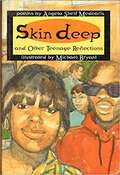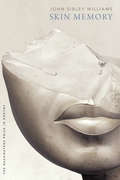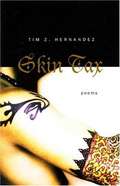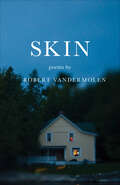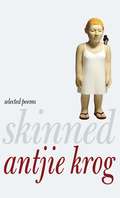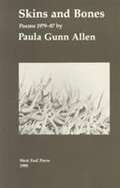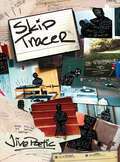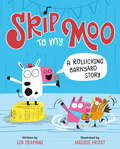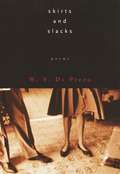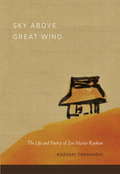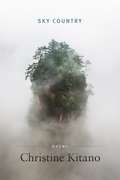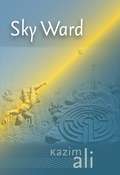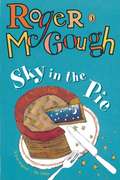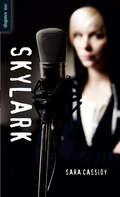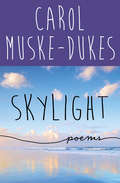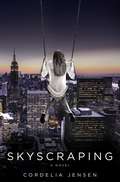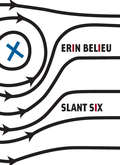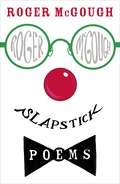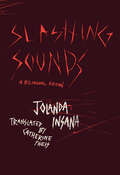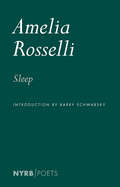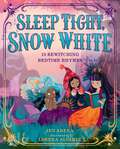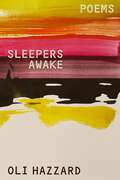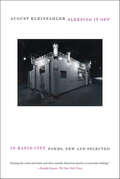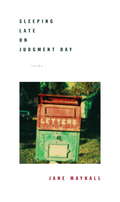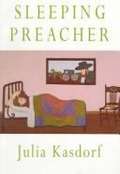- Table View
- List View
Skin Deep And Other Teenage Reflections
by Angela Shelf MedearisAn insightful collection of easy-to-read poems about the problems and frustrations of being a teenager
Skin Memory (The Backwaters Prize in Poetry)
by John Sibley WilliamsA stark, visceral collection of free verse and prose poetry, Skin Memory scours a wild landscape haunted by personal tragedy and the cruel consequences of human acts in search of tenderness and regeneration. In this book of daring and introspection, John Sibley Williams considers the capriciousness of youth, the terrifying loss of cultural identity and self-identity, and what it means to live in an imperfect world. He reveals each body as made up of all bodies, histories, and shared dreams of the future. In these poems absence can be held, the body&’s dust is just dust, and though childhood is but a poorly edited memory and even our well-intentioned gestures tend toward ruin, Williams nonetheless says, &“I&’m pretty sure, everything within us says something beautiful.&”
Skin Tax
by Tim Z. HernándezFirst publication of poems by well-known activist and performance artist from the Central Valley of California.
Skin: Poems
by Robert VanderMolenThe first collection in over a decade from a master of his craft, Skin reflects earnestly on the miraculous moments found in the daily experiences of human life. Time and time again, Robert VanderMolen’s poems illuminate the cycles of human interaction alongside the slow-moving patterns of nature: “bark just separating / after nine thousand summers.” A speaker asks, “Is everything too old or too new?” and the resounding answer throughout Skin is that it’s a bit of both. Colorless birds, “a deep sweep of wind,” and arrowheads found in a dying red oak all point to fragmented moments that make up what it means to stitch one’s life together. “Attentiveness is my best friend,” a speaker remarks off-handedly, but this affair with observation is earnest and real.Skin rewards the reader through a tacit understanding that everything in life is part of something larger that we can’t see: the endless “thoughts that slide / into notice” where “in the chill of privacy / one seeks promise.”
Skinned: Selected Poems
by Antjie KrogOne of South Africa's greatest living poets selects from her most recent poems and also from the poems and the themes that best represent her from across her long career.Part One of Skinned contains poems about writing, family and love poems. The poems in second part were chosen from a volume featuring a long epic poem based on the life of Lady Anne Barnard from Scotland, who accompanied her husband to Cape Town and lived in the castle there from 1797 until 1802. This volume was written during the height of apartheid and the poet chose Lady Anne as representative of the colonial vision. Part Three contains extracts from several speakers who lived in the land before the likes of lady Anne arrived. Krog includes here interviews with inhabitants of the stone desert, three re-workings of Bushmen or Xam narratives, as well as a translation of an oral Xhosa praise poem. Part Four represents the political turmoil of South Africa and the divisions within Africa. The poems come from volumes that explored how blacks and whites identifying with the oppressed were removed from official history. The present volume as a whole explores the necessity of "a change of tongue" in order to be.
Skins and Bones: Poems 1979-87
by Paula Gunn AllenThese poems offer a vision of history, Indian and colonial; stories of contemporary Indian life as current as headlines; and family poems emphasizing the rich cultural mix of the author's Laguna Pueblo-Sioux-Lebanese-Scots background.
Skip Tracer
by Jive PoeticAn innovative memoir—composed of poems, prose, and photographs—that engages with the Afro-Caribbean diaspora, cultural identity, music, and masculinity, by a poetry legend. Blending poetry and prose, music, and genealogy, Jive Poetic’s Skip Tracer is a memoir structured as a “hybrid sound system” (complete with “records,” “tracks,” “decks,” and “channels”), expertly curated to convey the complexity of Blackness in the Americas. In this ancestral and cultural excavation, Jive conducts archival and oral-history research into his family’s connections to Jamaica, Panama, Brazil, and Cuba to explore the impact of culture, environment, and family on first- and second-generation Black Americans in the United States. He also traces the profound influence that hip-hop, soul, R&B, reggae, and other popular musical genres have had on him—all the while performing a dynamic re-creation of his legendary onstage persona on the page. A raw and affecting indictment of police violence and racism in the United States, Skip Tracer is also a searingly honest exploration of personal identity, power, and privilege—all expressed in the unmistakable language, rhythm, and style that characterizes Jive’s live performances.
Skip to My Moo: A Rollicking Barnyard Story
by Iza TrapaniMoo-ve and groove to this fanciful picture book retelling of "Skip to My Lou" as the farm animals put on their dancing shoes for a hoedown, by bestselling author Iza Trapani.Skip, skip, skip to my moo, skip to my moo my darlings! Moo-ve and groove with your favorite farm animals as cow begins a raucous hoedown in the barnyard. Follow the animals as they do-si-do, two-step, sashay, and line dance their way to the best barn party you ever saw.
Skirts and Slacks
by W.S. Di PieroW. S. Di Piero, a fresh and powerful voice in American poetry, opens this collection about public and private worlds with poems that revist the deaths of his parents. It is an important adult passage for him, and for them a last chance to leave a message: his father lying in bed, "bemused and contemptuous / of the hell in which he lay"; his mother soon to be laid out in the cheap gold flats "that made her look young and men look twice." Di Piero writes poems of relationships, of ordinary beauty, of the deep, vsieral memories that shape who we become. He reveals the art in the everyday--sometimes literally, as when he spies a Vermeer beauty in a girl with nose studs at the ATM, or Van Gogh's self-portrait in a small-time bookie. Whether describing the uncertainty of sexual love ("...your footpads / wet after a bath / left prints like / our conversations / every which way") or a panhandler in Port Authority ("Show you to your bus / or an excellent candy bar?"), he is delicate and direct at once, a no-nonsense guide to his surroundings who is moved by what he sees. His strong, elegantly simple statements of truths of feeling go beyond the pleasure of the words themselves and restore us to the thrill of honesty in our own lives.From the Hardcover edition.
Sky Above, Great Wind: The Life and Poetry of Zen Master Ryokan
by Kazuaki TanahashiRyokan (1758-1831) is, along with Dogen and Hakuin, one of the three giants of Zen in Japan. But unlike his two renowned colleagues, Ryokan was a societal dropout, living mostly as a hermit and a beggar. He was never head of a monastery or temple. He liked playing with children. He had no dharma heir. Even so, people recognized the depth of his realization, and he was sought out by people of all walks of life for the teaching to be experienced in just being around him. His poetry and art were wildly popular even in his lifetime. He is now regarded as one of the greatest poets of the Edo Period, along with Basho, Buson, and Issa. He was also a master artist-calligrapher with a very distinctive style, due mostly to his unique and irrepressible spirit, but also because he was so poor he didn't usually have materials: his distinctive thin line was due to the fact that he often used twigs rather than the brushes he couldn't afford. He was said to practice his brushwork with his fingers in the air when he didn't have any paper. There are hilarious stories about how people tried to trick him into doing art for them, and about how he frustrated their attempts. As an old man, he fell in love with a young Zen nun who also became his student. His affection for her colors the mature poems of his late period. This collection contains more than 140 of Ryokan's poems, with selections of his art, and of the very funny anecdotes about him.
Sky Country (American Poets Continuum)
by Christine KitanoChristine Kitano's second poetry collection elicits a sense of hunger-an intense longing for home and an ache for human connection. Channeling both real and imagined immigration experiences of her own family-her grandmothers, who fled Korea and Japan; and her father, a Japanese American who was incarcerated during WWII-Kitano's ambitious poetry speaks for those who have been historically silenced and displaced.Christine Kitano's first collection of poetry, Birds of Paradise, was published by Lynx House Press. She lives in Ithaca, NY, where she is an assistant professor of creative writing, poetry, and Asian American literature at Ithaca College.
Sky Ward (Wesleyan Poetry Series)
by Kazim AliDrunk on the sun and the sea, Kazim Ali's new poems swoop linguistically but ground themselves vividly in the daily and real. Both imprisoned by endlessness and dependent on it for nurturing and care, in Sky Ward Ali goes further than ever before in sounding out the spaces between music and silence, between sky and ocean, between human and eternal. "Daily I wish stitched here to live," moans his Prometheus, wondering what release from familiar bondage might actually portend. "So long liberation," his Icarus sings as he plummets from the sky with desperation and grace, ready to unfeather and plunge into the everything-new. Whether in the extended poem-prayer to Alice Coltrane or in the "deleted scenes" and "alternate endings" to his critically acclaimed volume Bright Felon, or in the spirit-infused and multi-faceted lyrics he has become known for, Ali once again reinvents possibilities for the personal lyric and narrative.
Sky in the Pie
by Roger McGoughWaiter, there's a sky in my pie!Roger McGough has cooked up a delicious feast of poems. This spicy collection contains only the finest ingredients - wit, sparkle and thought-provoking insight from a very superior source. Get ready to have your tastebuds tickled!Warning: some poems will make you choke with laughter, some need to be chewed very carefully.
Skylark (Orca Soundings)
by Sara CassidyAngie lives in an old car with her brother and mother. Homeless after their father left to find work, the family struggles to stay together and live as normally as possible. It is difficult though. Between avoiding the police and finding new places to park each night, it is a constant struggle. When Angie discovers slam poetry, she finds a new way to express herself and find meaning and comfort in a confusing world.
Skylight: Poems
by Carol Muske-DukesPoetry from a writer celebrated as one of the most distinctive voices of her generationAmong the thirty-five poems in Skylight are sonnets, sestinas, and free verse forms on topics ranging from politics to architecture and science. In one volume, Muske-Dukes, National Book Award finalist and former Poet Laureate of California, incorporates multitudes, unified by her lyrical style and rapier-sharp observations. The sonnet "Fireflies" explores a strained relationship that is healed, for one moment, in a nighttime walk lit by the pulsing signals of firefly life. "The Funeral" confronts the stark playground atmosphere in the wake of a child's funeral. In the melancholy and unforgettable title poem, an "apartment in the sky" in New York City spins before the reader's eyes.
Skyscraping
by Cordelia JensenA heartrending, bold novel in verse about family, identity, and forgiveness Mira is just beginning her senior year of high school when she discovers her father with his male lover. Her world-and everything she thought she knew about her family-is shattered instantly. <P><P>Unable to comprehend the lies, betrayal, and secrets that-unbeknownst to Mira-have come to define and keep intact her family's existence, Mira distances herself from her sister and closest friends as a means of coping. <P>But her father's sexual orientation isn't all he's kept hidden. A shocking health scare brings to light his battle with HIV. <P> As Mira struggles to make sense of the many fractures in her family's fabric and redefine her wavering sense of self, she must find a way to reconnect with her dad-while there is still time. <P>Told in raw, exposed free verse, Skyscraping reminds us that there is no one way to be a family.
Slant Six
by Erin BelieuHonored as one of "10 Favorite Books of 2014" --Dwight Garner, The New York Times Honored as a "Standout Book of 2014" --American Poet magazine "Belieu oscillates between dark humor, self-consciousness, and pointed satire in a fourth collection that’s equal-opportunity in its critique. In the world of these poems, no one is inno¢ everyone is confined to the complexity, absurdity, and, above all, fallibility of their human condition. . . . Anchoring the work is a conversational, lyrical speaker willing to implicate herself as part of the political and social constructs she criticizes, as when she depicts a Southern American culture still reeling from its history of social injustice, and even the Civil War: "Don’t tell us/ history. Nobody hearts a cemetery/ like we do. ” It’s a fantastic collection; Belieu desires not to dress issues up but confront them. ”--Publishers Weekly, starred review "A smart and nettling book of poems -- about love, sex, social class and our free-floating anxieties -- from a writer who is a comedian of the human spirit. Her crisp free verse has as many subcurrents as a magnetic field. ”--Dwight Garner, The New York Times "Politics, pop culture, and parenthood appear here along with reflections on our collective moments of hypocrisy and hope. ''12-Step,'' one of the most resonant entries, begins innocuously with a meditation about lighthouses, then the speaker gathers speed and confidence and reaches a risky but profound one-word stanza--''myself''--before ending with a haunting inversion of the Serenity Prayer used by Alcoholics Anonymous. Amid the quips and the elegant observations about immortality, Belieu''s speakers never forget their responsibilities, or their possibilities. " --Booklist "From poem to poem in the smart, savvy Slant Six, Belieu channels an updated American idiom, one of stubborn in-betweenhood. Like the plain-spoken poetry that plumbed the depths of American consciousness in the 20th century, Belieu trawls the shallows of today’s America and finds just as much caught in its oily reflections as in its murkier subcurrents. It’s ''[b]etter,'' she suggests, ''to forget perfection. ''" --The Boston Globe "I’ve never read a poem by Erin Belieu that I didn’t want to immediately rip from its bindings so I could fold it up and carry around in my pockets and read so many times that the paper turned back into pulp. She’s just that good. That honest and brave and beautiful and wise and funny. She writes poems we need. Poems that say who I am and who you are and how and why we got to be this way. Poems that wonder if we can ever change. Poems that know us and show us and grace us. Poems that remember us and forget us and leave us dazzled in their dust. In Slant Six, she’s outdone herself. It’s a spellbinding, heart-opening beauty of a book. ” --Cheryl Strayed "Erin Belieu . . . is always ready to surprise, to astonish, and, ultimately, to defy comparison. "--Boston Book Review "[One] of America''s finest poets. "--Robert Olen Butler Erin Belieu''s fourth collection, Slant Six, is an inundation of the humor and horror in contemporary American life--from the last saltine cracked in the sleeve, to the kitty-cat calendar in an office cubicle. With its prophecies of impending destruction, and a simultaneous flood of respect for Americans, Erin Belieu''s poems close like Ziploc bags around a human heart. From "12-Step": I am considering lighthouses in a completely new light-- their butch neutrality, their grand but modest surfaces. A lighthouse could appear here at any moment. I have been making this effort, placing myself in uncomfortable positions, only for the documented health benefits . . .
Slapstick
by Roger McGoughIf Philosophy is the Why?And Science is the How?Then Poetry is the Wow!In this stunning, brand-new volume, you'll discover poems about poems, poems about life, poems about kangaroos and chameleons and caterpillars (though not in the same verse) and many more. This touching and thought-provoking collection will make you laugh, cry, or simply say 'Wow!'
Slashing Sounds: A Bilingual Edition (Phoenix Poets)
by Jolanda InsanaThe first collection of Italian poet Jolanda Insana’s work to be published in English, featuring transgressive poems that evidence the power of language. Jolanda Insana’s Slashing Sounds uses invectives, fragments, epigrams, and epigraphs to construct poems that pulse with the texture of an idiosyncratic Sicilian dialect. The poems in this collection are ferocious, irreverent, strange, snarky, and otherworldly. Insana’s commitment to contentiousness, her brutal and skeptical eye, and her preoccupation with language make Insana’s poetry particularly arresting. For Insana, there is no subject more worthy of our interest than language’s misfires and contradictory impulses—language being the ultimate arrow, forging a direction in the world and forcing a turn toward whatever reality appears in front of you. The first book-length collection of Insana’s poetry published in English, Slashing Sounds is a powerful offering that addresses a lack of female Italian voices in Anglophone poetry publishing.
Sleep
by Amelia RosselliA major, career-spanning collection of an Italian master's poetry in English, gathered together for the first time. Amelia Rosselli is one of the great poets of postwar Italy. She was also a musician and musicologist, close to John Cage and Karlheinz Stockhausen, and she waged a lifelong battle against depression. The child of Carlo Rosselli, a significant anti-fascist intellectual who was assassinated with his brother Nello in 1937, Amelia grew up in exile and attended high school in Mamaroneck, New York. English poetry, especially the lyrics and sonnets of Shakespeare and the Elizabethans, became a prime reference for her own poetry, which combines modernist experimentation with variations on more traditional forms. The elaborate, archaic, yet thoroughly modern poems, at once stumbling and singing, that Rosselli composed in English and gathered under the title Sleep are a beautiful and illuminating part of her work. Six of the poems were published by John Ashbery in the 1960s but have otherwise been unavailable to English readers. They are published here for the first time outside of Italy.
Sleep Tight, Snow White
by Jen ArenaA Mother Goose for the new millennium: bedtime rhymes for all your favorite princes, princesses, and nursery rhyme characters! Everyone has a hard time nodding off sometimes—from Prince Charming, who snores so loud it&’s alarming, to Hansel and Gretel, who have Sleepytime tea in the kettle. With a good night&’s sleep, even the Wicked Queen can have a new day, fresh and clean! Say good night to your favorite characters from beloved fairy tales and nursery rhymes in this enchanting bedtime book from author Jen Arena with gorgeous illustrations from Lorena Alvarez.
Sleepers Awake: Poems
by Oli HazzardA brilliantly inventive book of poems from a fierce poetic voice, whose work John Ashbery called “exciting, necessary, and new.”Sleepers Awake, Oli Hazzard’s third collection, emerges from the daily disarray of care and work, nature and technology. Its ambitious, formally various poems extract “the ore / from boredom,” as memory —personal, familial, social, historical—and the collective memory of poetry itself are wrenched out of shape by dramatic disruptions in rhythm, space, and scale. The sadness and pain of forgetting is here too, alongside its unexpected forms of potential.The title, borrowed from the Lutheran hymn that inspired a Bach cantata, catches the book’s dreamy, kaleidoscopic, cross-temporal dialogues. By way of satirical, allusive, tender, hopeful poems, Sleepers Awake makes spaces for intimacy with the reader, arguing “through an off-key melody / for the jovial texture of batshit relations, for the pleasure of live-drawing in skeptical company.”
Sleeping It Off in Rapid City: Poems, New and Selected
by August KleinzahlerThe first broad retrospective of August Kleinzahler's career, Sleeping It Off in Rapid City gathers poems from his major works along with a rich portion of new poems that visit different voice registers, experiment with form and length, and confirm Kleinzahler as among the most inventive and brilliant poets of our time. Travel—actual and imaginary—remains a passion and inspiration, and in these pages the poet also finds "This sanctified ground / Here, yes, here / The dead solid center of the universe / At the heart of the heart of America."
Sleeping Late on Judgment Day
by Jane Mayhall“My heart is bursting with homage as I / head off to a hostile eternity,” writes Jane Mayhall, now eighty-five, who wrote most of these poems in an urgent outpouring over the last few years. From the decades-outdated subway token in the bottom of her shoulder bag, which calls forth earlier days in New York City, to the violin her father practiced among the pantry’s jam jars in her Kentucky childhood, Mayhall plucks small treasures that bespeak her fierce devotion to life, with its clutter of memories and imperfections. In her tightly knotted, beautifully turned short poems, she elegizes a world not quite gone, and brings us into contact with some of her contemporaries, from Lincoln Kirstein to Theodore Roethke. Chief among her cherished memories is her long bohemian marriage, which she recalls in a series of ravishing love poems to her late husband. In lines saturated with feeling she describes how she accommodates her grief at losing him and, as throughout this exquisite volume, how we must continue to greet life, in all its gorgeous strangeness.
Sleeping Preacher
by Julia KasdorfWinner of the 1991 Agnes Lynch Starrett Poetry Prize. The poems in this book deal with life in a Pennsylvania Mennonite community and the tensions and conflicts that exist for the speaker as she tries to be true to two worlds, the other being New York City.
